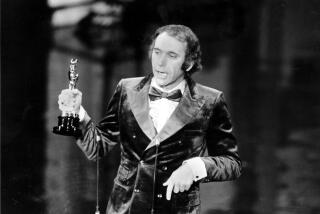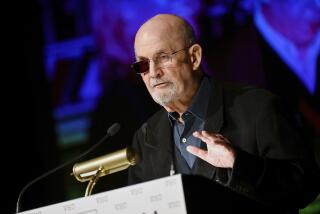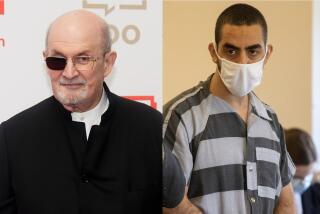Author Salman Rushdie reflects on new role as screenwriter
Salman Rushdie has led a very full life: successful novelist at age 33, threatened novelist at 41, cultural icon today. Now, thanks to the persistence of director Deepa Mehta, the 65-year-old writer can add screenwriter to his list of credits. For Rushdie has done what many thought impossible, adapting his sprawling, Booker-prize-winning novel “Midnight’s Children” that he wrote 31 years ago into a manageable screenplay.
It’s an effort that’s been tried twice before with little success: first by the producers behind Richard Attenborough’s 1982 film “Gandhi” and more recently as a five-part miniseries from the BBC. Rushdie is grateful that neither of those adaptations came to fruition.
“Even though I was involved in the BBC series, when I look at the scripts now they seem wooden compared to this screenplay,” he said during an interview at the Toronto Film Festival, where “Midnight’s Children” is screening. “And I know that this cast is much better than the cast we had then. And I know that the director is much better than the director we had then. So actually, it has a much better shot in this form.”
PHOTOS: 10 must-see films at the Toronto Film Festival
While reviews have been mixed for this epic movie -- which centers on two baby boys, one rich, one poor, switched at birth, and traces their growth against the backdrop of an evolving India and its neighbors Pakistan and Bangladesh -- Rushdie is quite content with the finished product.
“There was a day when I came to Toronto and Deepa and her editor, Colin Monie, showed me what was substantially the final cut and I was actually so moved that I was close to tears. I had a lump in my throat. I couldn’t speak. All I could do was get up and hug them both. We’ve got the film,” he said. “And that took a year. A year in the cutting room.”
The film first debuted at the Telluride Film Festival and will premiere Sunday evening in Mehta’s adopted hometown. It has yet to secure distribution stateside but should land a buyer.
The substantial amount of work that went into making this visually arresting movie does not go unnoticed by audiences. Filmed in 64 different locations in Sri Lanka, under a secret name, the film was a complex endeavor that experienced a brief shutdown when the Iranian government got word that a film based on Rushdie’s work was being filmed in the country and wanted it stopped.
Rushdie plays down the experience, admitting it was “scary” but adding that it was very brief and things were up and running again quickly without having to switch locations.
As an added bonus on the film, Rushdie was asked to serve as the narrator, something that came late in the editing process, but one he could embrace by finding a symmetry between himself and the main character.
“The way I rationalized it for myself was in the novel Saleem is telling his story retrospectively, from about the age he reaches at the end of the story [he is 31 when the story ends]. Now he would be 65, but he’s still only telling the story of his life up to the age of 31, so the narrator is an older voice,” said Rushdie. “I’m pleased that I did it, except for when I sing. That is the bit that makes me want to hide under the sofa. I have no illusions about my singing voice.”
But the man does like to act. He’s appeared in a few films and has said in the past that if he wasn’t a writer he’d be an actor. Mehta, he says, has another script in the works about Sikh criminals in Vancouver and she wants him to play a role in the movie.
“I’ve always wanted to play a gangster, so maybe if she gets to make that film I’ll get to work with her as an actor.”
RELATED:
‘Cloud Atlas’ premieres at the Toronto Film Festival
Telluride 2012: Making Rushdie’s ‘Midnight,’ no small task
Lawrence and Cooper make a statement in ‘Silver Linings Playbook’
More to Read
Only good movies
Get the Indie Focus newsletter, Mark Olsen's weekly guide to the world of cinema.
You may occasionally receive promotional content from the Los Angeles Times.








